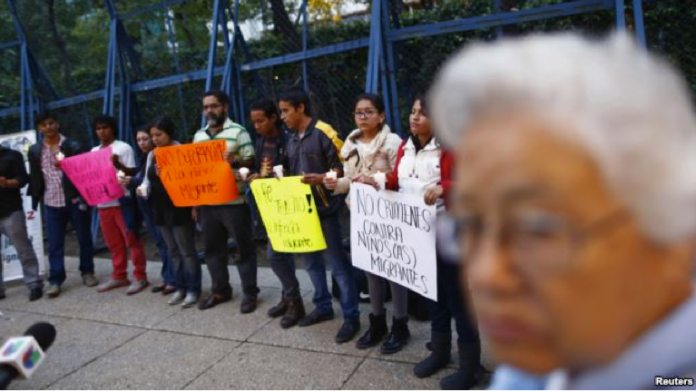

Reuters – WASHINGTON / MCALLEN, TEXAS—President Barack Obama’s pledge to fast-track the deportation of migrant children from Central America is out of step with the opinion of a majority of Americans, who say the children should be allowed to stay in the United States, at least for a while.The results of a Reuters/Ipsos poll highlight the complexity of the child migrant issue for Obama, who has sought to emphasize his compassion while also insisting that his administration plans to send home most of the children, many of whom have fled violence in their homelands.
The poll, conducted on July 31-Aug. 5, found that 51 percent of Americans believe the unaccompanied children being detained at the U.S.-Mexico border should be allowed to remain in the country for some length of time.
That included 38 percent who thought the unaccompanied youngsters should be sheltered and cared for until it was deemed safe for them to return home. Thirteen percent said the children should be allowed to stay in the United States, while 32 percent said the children should be immediately deported.
“Overall, people are humane and they understand that no matter what our situation is with the budget, whether or not we can afford this, these are kids. No matter what the immigration system is, they are innocent,” said Lance Lee, 42, of Alabama, who took part in the survey.
But Lee said he wanted to see the border sealed to prevent another wave of illegal migrants entering the United States.
Between October 2013 and the end of July of this year, nearly 63,000 unaccompanied children have flooded across the southwestern U.S. border. Many are from Honduras, El Salvador and Guatemala.
Concerned that smugglers are encouraging the influx by spreading rumors that the children will be allowed to stay in the United States, the Obama administration has toughened its public messaging, warning that newly arriving youngsters will be quickly sent home.
Obama is widely seen as acting, at least in part, because of intensifying election-year pressure from Republicans, who say he has not moved swiftly enough to curb the influx.
The Justice Department is placing child migrants on a faster track for deportation hearings, and the White House has called for changes to a 2008 law, intended to combat human trafficking, that bars the immediate removal of Central American children.
Fast-track opposition
Those policies have angered some of Obama’s Democratic allies in the U.S. Congress and Hispanic groups that represent an important base of the president’s political support.
Democratic Representative Luis Gutierrez, a leading advocate in the U.S. Congress of immigration reform, has vehemently criticized the fast-track policy, which includes prioritizing children over adults at deportation hearings.
“We should not take short-cuts and circumvent due process at this critical time when children are fleeing violence and asking for our help,” Gutierrez said in a statement emailed to Reuters.
At the same time, Republicans have sharply criticized Obama’s policies, saying his 2012 decision to give temporary deportation relief to some young people brought to the United States by their parents had encouraged the border influx.
Emphasizing the compassionate side of the administration’s policies, Vice President Joe Biden last week urged private law firms to offer the children free legal assistance.
“There’s an awful lot of kids who need help. They need representation,” Biden said.
The Reuters/Ipsos poll showed that 48 percent of Democrats believe the children should be cared for until it is safe for them to return home, against 30 percent of Republicans and 37 percent of people who identified themselves as independents.
The question of where and how to house the children while they await deportation hearings has stirred strong responses in some communities where shelters were planned. There were fears the youngsters could bring crime and disease to neighborhoods and create an extra burden on public finances.
Flag-waving demonstrations took place in border cities like Oracle, Arizona while local government in communities such as such as Murrieta, California, and League City, Texas, voted to rejected any plan to build shelters.
But the survey showed that the opposition to housing the children is not as widespread as the anti-immigrant images that dominated the media in recent weeks may have suggested.
Asked if they supported allowing the unaccompanied minors to be temporarily relocated to their communities, 41 percent said they would support such a step, while 48 percent said they opposed it.
General ambivalence
“There are these really passionate, smaller pieces of the population that are really loud about it, but the broader public is much more ambivalent,” Ipsos pollster Chris Jackson said.
Also, while some people may in principle support the idea of housing children in their communities, the reality of shelters in their communities can change minds.
Maryland Governor Martin O’Malley initially criticized the Obama administration’s plans to quickly deport the children, but he later pushed back against a proposal to shelter them at a facility in his state.
“A lot of Americans are compassionate, but they want other people to bear the burden of that compassion,” said John Pitney, a politics professor at Claremont McKenna College.
Last week, the U.S. government said it planned to soon close three interim shelters on military bases that have housed thousands of unaccompanied children, due in large part to decreasing numbers of minors making the trip.
The number of children crossing the border in the Rio Grande Valley of Texas was estimated to have slowed from more than 300 unaccompanied children per day in June to less than 150 in July, federal officials said.
The Reuters/Ipsos poll of late July to early August interviewed 1,566 Americans online. The precision of the Reuters/Ipsos online polls is measured using a credibility interval. In this case, the survey had a credibility interval of plus or minus 2.8 percentage points.
